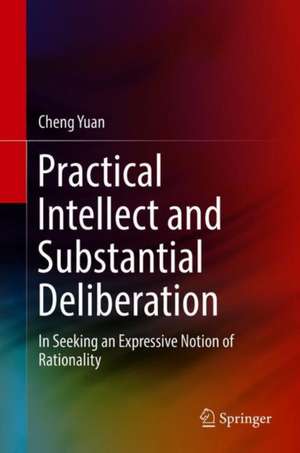Practical Intellect and Substantial Deliberation: In Seeking an Expressive Notion of Rationality
Autor Cheng Yuanen Limba Engleză Hardback – 22 ian 2019
Methodologically, it not only reconciles the phenomenological-hermeneutic tradition with analytical approaches, but also integrates various theories, such as moral psychology, emotional studies, action theory, decision theory, performativity studies, music philosophy, tacit knowledge, collective epistemology and media theory. Further, its use of everyday cases, metaphors, folk stories and references to movies and literature make the book easy to read and appealing for a broad readership.
Preț: 391.02 lei
Nou
Puncte Express: 587
Preț estimativ în valută:
74.82€ • 78.28$ • 62.15£
74.82€ • 78.28$ • 62.15£
Carte tipărită la comandă
Livrare economică 02-16 aprilie
Preluare comenzi: 021 569.72.76
Specificații
ISBN-13: 9789811086502
ISBN-10: 9811086508
Pagini: 190
Ilustrații: XXVII, 189 p. 1 illus.
Dimensiuni: 155 x 235 x 15 mm
Greutate: 0.49 kg
Ediția:1st ed. 2018
Editura: Springer Nature Singapore
Colecția Springer
Locul publicării:Singapore, Singapore
ISBN-10: 9811086508
Pagini: 190
Ilustrații: XXVII, 189 p. 1 illus.
Dimensiuni: 155 x 235 x 15 mm
Greutate: 0.49 kg
Ediția:1st ed. 2018
Editura: Springer Nature Singapore
Colecția Springer
Locul publicării:Singapore, Singapore
Cuprins
Plan, Rationality and Self-Orientation (Selbstorientierung).- Performing Deliberation.- Sensitive Perception, Stable Disposition and Deliberation: Starting from “Virtue is Knowledge”.- Deliberative Emotion.- “animal rationale”: Revised Reading.- Rationality as Architecture and/or Music-Playing.
Recenzii
“I recommend this book enthusiastically to anyone interested in ethics, moral psychology or philosophy of action, comparative philosophy, and Chinese philosophy.” (Zemian Zheng, Dao, Vol. 18, 2019)
Textul de pe ultima copertă
This book presents an anti-intellectualist view of how the cognitive-mental dimension of human intellect is rooted in and interwoven with our embodied-internal components including emotion, perception, desire, etc., by investigating practical forms of thinking such as deliberation, planning, decision-making, etc. With many thought-provoking statements, the book revises some classical notions of rationality with new interpretation: we are “rational animals”, which means we have both rational capabilities, such as calculation, evaluation, justification, etc., and more animal aspects, like desire, emotion, and the senses. According to the traditional position of rationalism, we use well-grounded reason as the fundamental basis of our actions. But this book argues that we simply perform our practical intellect intuitively and spontaneously, just like playing music. By this the author turns the dominant metaphor of “architecture” in understanding of human rationality to that of “music-playing”. This book presents a groundbreaking and compelling critique of today’s pervasively reflective-intellectual culture, just as Bernard Williams, Charles Taylor and other philosophers diagnose, and makes any detached notion of rationality and formalized understanding of human intellect highly problematic.
Methodologically, it not only reconciles the phenomenological-hermeneutic tradition with analytical approaches, but also integrates various theories, such as moral psychology, emotional studies, action theory, decision theory, performativity studies, music philosophy, tacit knowledge, collective epistemology and media theory. Further, its use of everyday cases, metaphors, folk stories and references to movies and literature make the book easy to read and appealing for a broad readership.
Caracteristici
Explores the fundamental philosophical questions on the self-world rational relationship without conforming to academic stereotypes Presents a significant diagnosis of various forms of intellectualism (philosophical, epistemic, moral, etc.), which critically evaluates today’s pervasively reflective-intellectual culture Makes any detached notion of rationality and formalized understanding of human intellect highly problematic, which can potentially inspire to the current debate over artificial intelligence Involves various fields of study and philosophical literature from ancient to contemporary, tightly connected by an ongoing theme Uses everyday cases, metaphors, folk stories and references to movies and literature, making the arguments more penetrating and appealing for a broad readership
